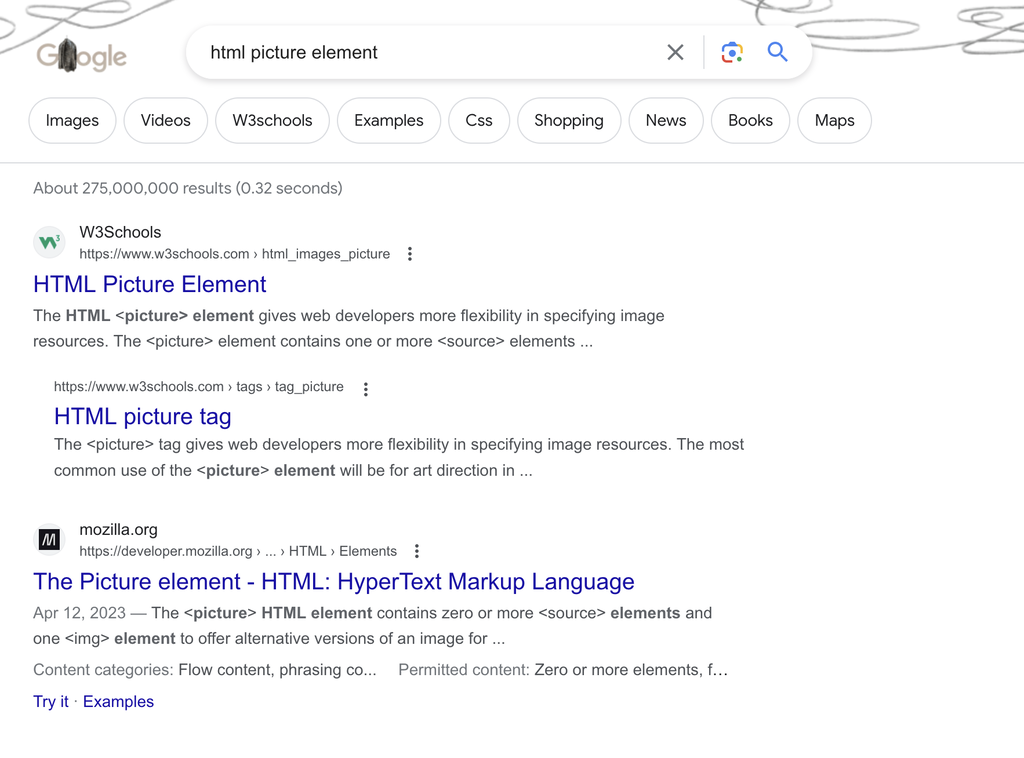A few months ago, Cory Doctorow1 wrote a very memorable blog post about the enshittification of social-media platforms, focused on TikTok. I've been thinking since then about how prevalent this trend is and how much it makes me worry for our future.
It's mentioned in Doctorow's piece, but I really want to emphasize how deleterious this effect has been on Google Search. I remember when Google was introduced! By the time I first had access to the Internet in school (perhaps 1998 or 1999), there were two options for finding things you didn't already have a link to: Yahoo (which had terrible free-form search but a passable directory you could click through like the index to some giant poorly-edited encyclopedia), and Ask Jeeves (which was pretty good at letting you type a query into a box and get results). Then, some time around 2000 or 2001, Google entered into the public consciousness, and it was like crack. Anything you wanted to know about, you could just put into the box and get real, high-quality results from legitimate sources! Unbelievable!
Now, though, Google is a shell of its former self. Results for technical queries are overwhelmed by low-quality content farms, and anything even slightly commercial is dominated by ads. How did we get here? I find it unbelievable that literally any person working on Google Search thinks that the often-inaccurate, ad-filled W3Schools is a better result for web-development, but nearly every search results in W3Schools at the top, with much-better secondary source MDN below it, and primary sources 10 or 20 items down, below the fold. Similarly, searches for Python builtins often feature low-quality content farms like geeksforgeeks with the actual documentation falling below the fold. And don't even try using Google to search for something you can buy because literally everything above the fold is sponsored content (a.k.a. ads).
Some of this is clearly Google's greed and search for higher short-term returns at the expense of customer satisfaction1, but some is just that search is now fundamentally a kind of-asymmetric warfare; the Internet is big business, and there are always going to be more people gaming garbage content to the top of their search results than there are going to be people who can design gabage-proof ranking systems. Of course, this is only about to get worse; with the rise of Large Language Models2, it's trivial for any "SEO consultant" to pump out acres of lies, tailored to look delicious to search engine crawlers.
The "standard" trick to avoid the enshittification of search engines is to use operators like site:reddit.com
and site:stackoverflow.com to limit your search to Reddit and StackOverflow; both of these are websites where
real people who are either enthusiasts or subject-matter experts post content; kind of like blogs before the world
collectively forgot what blogs were. Both are somewhat notable for being large, for-profit companies that are
entirely dependent on volunteer work performed by people who write content, and by moderators. And, of course,
both are deep on the path to enshittification.
Reddit has been steadily making their product worse for years. Their new redesign3 is so widely reviled
by power-users that they've been forced to keep the old version up at old.reddit.com. The new
one is slow, bloated4, and (of course) full of obnoxious ads. Many power users also took to native applications, including Apollo by Christian Selig and popular Android app Sync. Of course, as you've
probably read, Reddit decided to extend a big middle finger to all third-party app developers a few weeks ago
and summarily kill them off. I personally am not a heavy Reddit user, but I exclusively use it through Apollo and simply will stop using it in 10 days when Apollo shuts down. However, I do sometimes want to look up information
about topics that are best-served by enthusiast forums like Reddit, whether that's product reviews5,
or just attempting to work around bugs in video games6, and I'll miss that as Reddit goes down
the drain. The casual users who mostly interact with Reddit via site:reddit.com aren't going to be affected
immediately, but if and when the most trustworthy posters leave, it'll have a lingering and debilitating effect
on content quality.
I'll remind you that Reddit pays no moderators, no editors. The only expenses it has are software developers (to work on the poorly-received website and mobile app), salespeople, and servers7. For this, Reddit has taken on more than one billion dollars of cash. I've run a lot of high-traffic websites. It does not cost one billion dollars to run Reddit. Based on their public traffic numbers, I would be surprised if their total hosting cost was over $100,000 per month (which suggests that they have enough capitalization to keep the site going for another 800 years).
I honestly can't imagine why the executives at Reddit have decided to do this; any revenue difference from people looking at the first-party website versus third-party applications is minimal8. Perhaps Steve Huffman is just mad that power users almost universally hate the products his company has put out for the past 5 years and wants to quash the competition? Or perhaps Reddit is due for another round of enshittification and the executive team was worried that third-party apps would shield their users from being adaquetely monetized. I remind you, their users are also the sole source of all of their content and value.
Stack Overflow is also taking a path into enshittification, although I admit I know far less about this one9. I do know that Stack Overflow's moderators have been on strike for two weeks; they claim that Stack Overflow's management is allowing LLM-generated content10. Why would one of the only remaining trusted websites on the Internet want to flood their pages with made-up content? What could they gain besides a temporary bump in traffic from being able to match literally every keyword with made-up results? Well, perhaps we can take some insight from the fact that Stack Overflow is now owned by multinational investment company Prosus, a company with no interest in providing educational content, but lots of interest in justifying the $1,800,000,000 that they spent on Stack Overflow. Again, let me remind you, Stack Overflow has nothing to spend money on except website development and hosting. They don't pay their moderators. They don't pay their users. One point eight billion dollars. Sheesh!
What does the future bring? Is every commercial website eventually going to pivot to abusing monetizing
their user-base? Does salvation lie in non-profit ventures like the Fediverse? So far, I'm doubtful. I'm pretty
happy on Mastodon, but even among the technical people I know, nearly all of them have gone back to Twitter. Among
the non-technical folks? Exactly zero made it to the Fediverse. The first-mover advantage of all the existing social
networks is far too strong. And the "Threadiverse"? Lemmy11 and Kbin are minuscule and have only had
very moderate growth during the "Reddit blackout".
Much though I may bemoan it, I don't think that Fully Automated Luxury Gay Space Social Networking is going to replace
enshittified commercial platforms any time soon; perhaps the best we can hope for is that the people working on the
next big mode of social networking will be inspired by the failures of the current market leaders and that those
software engineers will build something that can't be perverted by market forces into a brain-numbing "monetization"
factory.
And that brings us around to my worries for my own child's future. When he's assigned to write an essay about, say, the Civil War in the future, what will his sources be? Will he be able to find trustworthy content reviewed by human experts, or will the web merely be a cesspool of machine-generated nonsense tailored such that they can show you one or two ads before you realize it's nonsense? Should I be emulating Benj Edwards and buying a paper encyclopedia?
What a mess. Maybe the Internet was a mistake.
perhaps best-known as one of the editors of Boing Boing for almost 20 years
that is to say, the enshittification of Google
a technology that I don't expect to ever refer to as "AI"; it's not artificially-intelligent any more than the Windows recycling bin icon is artificially eco-friendly; ceci n'est pas une pipe!
well, new as of 2018
empty-cache load of "new reddit" is 19.56MB and takes 11.67s; empty-cache load of "old reddit" is 4.24MB and takes 1.87s. Both on 1Gbps fiber and an M1 Max Mac, so pretty much bast-case scenarios
it's often worth looking in /r/BuyItForLife
ugh I played through Jedi: Survivor recently and my console crashed every time I finished the Vader fight; thankfully, this was a known issue with a solution... that could only be found in a Reddit thread...
and, of course, a huge morass of management
I'm willing to guess that anyone who is savvy enough to use a native Reddit application also runs an ad-blocker, so the revenue is, what, better data to sell to marketers?
for better or worse, I've never been a Stack Overflow user. I learned to program long before it existed, and am just more comfortable reading documentation than I am reading Q&A's.
this technology is designed to make sentences that "sound plausible"; it is not designed to answer any real questions. 2
Lemmy is also marred by the politics of one of the project's founders, who is possibly a communist but not the good kind of crunchy communist that the fediverse likes; instead, perhaps the kind of who supports the CCP. Or perhaps not; this whole discussion has strong vibes of early-00's Tumblr threads, where someone posting five years ago in a comment thread on some other website is considered damning evidence that they're a fundamentally evil person



Want to comment on this? How about we talk on Mastodon instead? Share on Mastodon
Share on Mastodon